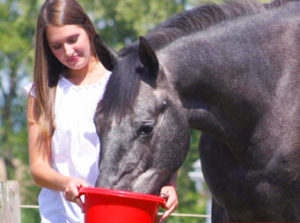Feeding Horses to Help Prevent or Treat Ulcers
Click here to read the complete article252 – May/June, 2018
By Heather Smith Thomas
 Many performance horses and show horses develop ulcers in the digestive tract, due to stress. Many things can cause stress in horses, including an unnatural environment, increased exercise, athletic competition, unnatural diet, etc. Stress can lead to gastric ulcers in horses just as it does in humans. Strategic feeding management can help minimize the incidence and severity of ulcers.
Many performance horses and show horses develop ulcers in the digestive tract, due to stress. Many things can cause stress in horses, including an unnatural environment, increased exercise, athletic competition, unnatural diet, etc. Stress can lead to gastric ulcers in horses just as it does in humans. Strategic feeding management can help minimize the incidence and severity of ulcers.
Dr. Stephen Duren, Performance Horse Nutrition, says that in the past we thought only in terms of gastric (stomach) ulcers in horses, but we now realize there can be colonic ulcers as well. Studies at University of Tennessee and at University of Kentucky, using ponies with cannulas (openings into the digestive tract) enabled researchers to sample material in the stomach and colon, and measure the changes that can occur.
“The initial thrust of early ulcer research was to find drug therapies and acid blockers that would help with the medical side of treatment. But along with the medical side, we also need to be aware of what we should do from a feeding standpoint, to help heal the condition, or prevent ulcers in the first place,” says Duren.
“Many ulcers occur in high-level athletes and show horses, for two reasons. First, we change their diet. As the horse goes from a pasture or relatively sedentary life to an active career, training for peak performance, his diet must change in order to provide the needed energy. He can’t get enough calories for the increased work, just by eating forages, to meet his energy requirements as an athlete. So we feed different ingredients that provide those calories,” he explains.
“This change in diet may cause ulceration because the main buffer for acid in the stomach is saliva. The horse produces about twice as much saliva eating hay (which takes longer, and also requires more mixing with saliva) than eating grain. The very nature of that new diet takes away some of the protection in the stomach,” says Duren.
Chewing stimulates saliva production, so the more the horse chews, the more saliva is produced. Horses at pasture are least prone to ulcers because they graze more or less continuously. Thus they are producing saliva almost continuously. “Acid in the stomach is produced on a continuous basis, so the constant eating is a help,” he says.
Click here to read the complete article252 – May/June, 2018










